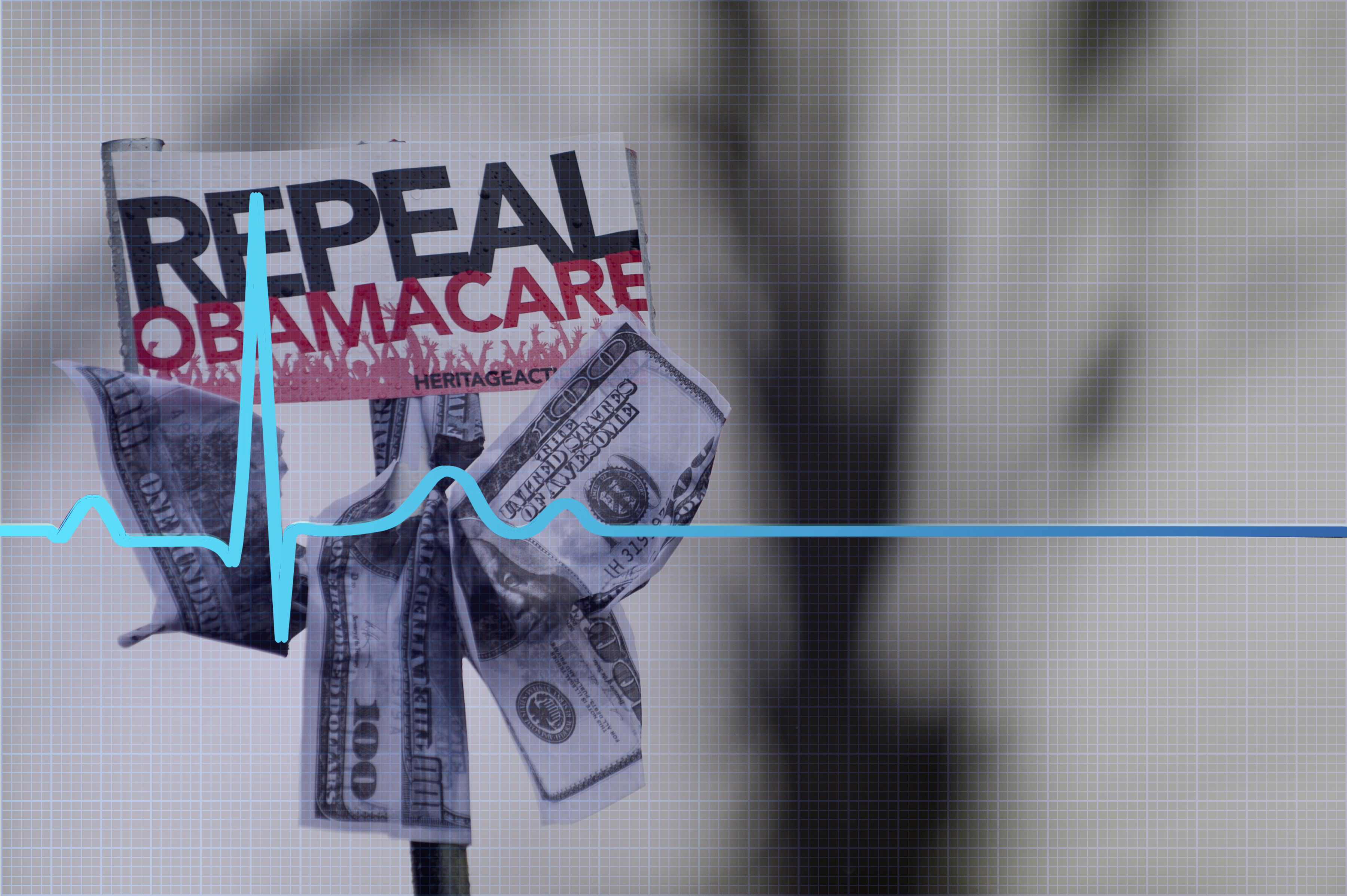How the GOP embraced being the Party of Death
Repealing the Affordable Care Act will surely result in preventable death and suffering. How do Republicans respond?


A free daily email with the biggest news stories of the day – and the best features from TheWeek.com
You are now subscribed
Your newsletter sign-up was successful
As part of their long-standing war on the Affordable Care Act, conservatives have filed a lawsuit willfully misreading the statute to deny upward of 10 million people subsidies to purchase insurance. This denial of insurance will almost certainly lead to significant amounts of preventable death and suffering.
Michael Strain of the American Enterprise Institute doesn't deny any of this. Instead, he argues that some suffering and death may well be a price worth paying:
In a world of scarce resources, a slightly higher mortality rate is an acceptable price to pay for certain goals — including more cash for other programs, such as those that help the poor; less government coercion and more individual liberty; more health-care choice for consumers, allowing them to find plans that better fit their needs; more money for taxpayers to spend themselves; and less federal health-care spending. This opinion is not immoral. Such choices are inevitable. They are made all the time. [The Washington Post]
At a high enough level of abstraction, what Strain is saying isn't wrong. Not all public policy can function on the basis of keeping mortality rates to the lowest possible number. Some lifesaving treatments might help so few people and cost so much that they might not be worth it. Even major infrastructure projects entail some risk of injury or death on the part of workers, but few people would argue that any such risk is unacceptable.
The Week
Escape your echo chamber. Get the facts behind the news, plus analysis from multiple perspectives.

Sign up for The Week's Free Newsletters
From our morning news briefing to a weekly Good News Newsletter, get the best of The Week delivered directly to your inbox.
From our morning news briefing to a weekly Good News Newsletter, get the best of The Week delivered directly to your inbox.
But the fact that the costs of the ACA might theoretically exceed the benefits doesn't get us very far. What benefits, exactly, would accrue if millions of people were denied medical coverage because the ACA is seriously damaged or destroyed? It's here that Strain's argument falls apart.
One potential line against the ACA is the radical libertarian one, holding that any effort by the government to provide health care to the non-affluent represents an unacceptable level of state coercion. The problem here is that the "freedom" to die of preventable illnesses and injuries is not one the vast majority of people value very highly. A Republican Party committed to these principles would be transformed into an electoral coalition that would make Barry Goldwater's 52 electoral votes in 1964 look robust.
Since the people responsible for the anti-ACA effort know this perfectly well, the constitutional arguments against the ACA have the advantage of not logically requiring the Supreme Court to rule the entire modern regulatory state unconstitutional. The disadvantage is that they ask the court to deny many millions of people health coverage based on liberty interests that are ludicrously trivial.
The litigants challenging the constitutionality of the ACA do not contend that the federal government cannot regulate national health-care markets. Rather, their constitutional argument boils down to an assertion that the government has the authority to assess a tax to compel people to purchase health insurance, but not a penalty. It's pretty hard to argue that the fate of liberty in America hinges on this formal limitation on federal power.
A free daily email with the biggest news stories of the day – and the best features from TheWeek.com
The more successful federalist argument launched against the Affordable Care Act is similarly unattractive. Chief Justice John Roberts' inept rewriting of the ACA's Medicaid expansion allowed states to opt out. Republican-controlled states have eagerly rejected the large amounts of federal money on offer to insure more poor residents, something that is likely to result in the unnecessary deaths of more than 5,000 people a year.
I don't think this particular protection of state autonomy is worth that many lives (or, indeed, a single life). But here's the kicker: The Supreme Court's decision does not even meaningfully protect state sovereignty. Under the court's theory, Congress could have enacted the ACA's Medicaid expansion by repealing the pre-existing Medicaid entirely. This, apparently, would be completely constitutional. There may be things worth 5,000 lives a year; an incoherent legal argument that doesn't even really protect states' rights isn't one of them.
Strain's arguments have similar problems. To his credit, he's not a libertarian radical who asserts that the federal government cannot play any role in expanding health-care coverage. Rather, "universal coverage should concern itself with the catastrophic expenses associated with serious medical events that will affect a minority of the population." The affluent, or people with good jobs, can get real medical coverage; the non-affluent might get some protection for disasters, but would have to pay through the nose for common medical procedures. Whether or not one prefers this policy alternative — which I think is far worse — there's not a lot of meaningful protection of "freedom" going on here. The number of lives worth sacrificing so that people can choose between a few more insurance alternatives — or between the "freedom" to pay for checkups for their children or their electric bill — strikes me as "zero."
And, of course, even this is too generous to the Republican reformers. The ACA isn't unpopular because it provides subsidies that are too generous or because the exchanges offer insurance that cover too many things. The Republican alternatives Strain discusses will all disappear should the ACA be destroyed, because the trade-offs involved will outrage many voters. The actual Republican alternative Strain thinks it's worth killing a lot of people for is "nothing."
But, hey, the next upper-class Republican tax cut could be even larger, and it's not going to be elite Republicans who pay the price. As the writer Roy Edroso puts it, Strain's argument can be summarized as "give me liberty and give you death." I think we can see why Republicans would prefer for the Supreme Court to do their dirty work.
Scott Lemieux is a professor of political science at the College of Saint Rose in Albany, N.Y., with a focus on the Supreme Court and constitutional law. He is a frequent contributor to the American Prospect and blogs for Lawyers, Guns and Money.
-
 Nepal’s fake mountain rescue fraud
Nepal’s fake mountain rescue fraudUnder The Radar Arrests made in alleged $20 million insurance racket
-
 History-making moments of Super Bowl halftime shows past
History-making moments of Super Bowl halftime shows pastin depth From Prince to Gloria Estefan, the shows have been filled with memorable events
-
 The Washington Post is reshaping its newsroom by laying off hundreds
The Washington Post is reshaping its newsroom by laying off hundredsIn the Spotlight More than 300 journalists were reportedly let go
-
 The billionaires’ wealth tax: a catastrophe for California?
The billionaires’ wealth tax: a catastrophe for California?Talking Point Peter Thiel and Larry Page preparing to change state residency
-
 Bari Weiss’ ‘60 Minutes’ scandal is about more than one report
Bari Weiss’ ‘60 Minutes’ scandal is about more than one reportIN THE SPOTLIGHT By blocking an approved segment on a controversial prison holding US deportees in El Salvador, the editor-in-chief of CBS News has become the main story
-
 Has Zohran Mamdani shown the Democrats how to win again?
Has Zohran Mamdani shown the Democrats how to win again?Today’s Big Question New York City mayoral election touted as victory for left-wing populists but moderate centrist wins elsewhere present more complex path for Democratic Party
-
 Millions turn out for anti-Trump ‘No Kings’ rallies
Millions turn out for anti-Trump ‘No Kings’ ralliesSpeed Read An estimated 7 million people participated, 2 million more than at the first ‘No Kings’ protest in June
-
 Ghislaine Maxwell: angling for a Trump pardon
Ghislaine Maxwell: angling for a Trump pardonTalking Point Convicted sex trafficker's testimony could shed new light on president's links to Jeffrey Epstein
-
 The last words and final moments of 40 presidents
The last words and final moments of 40 presidentsThe Explainer Some are eloquent quotes worthy of the holders of the highest office in the nation, and others... aren't
-
 The JFK files: the truth at last?
The JFK files: the truth at last?In The Spotlight More than 64,000 previously classified documents relating the 1963 assassination of John F. Kennedy have been released by the Trump administration
-
 'Seriously, not literally': how should the world take Donald Trump?
'Seriously, not literally': how should the world take Donald Trump?Today's big question White House rhetoric and reality look likely to become increasingly blurred
